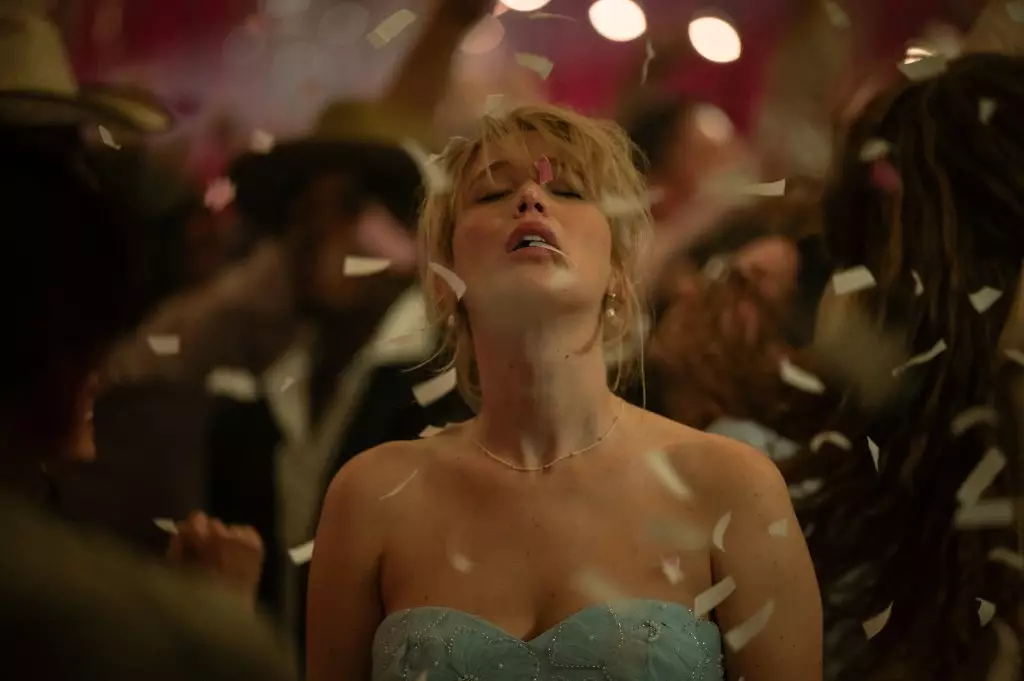Festival-goers at Cannes this evening were treated to a compelling albeit unsettling narrative with the world premiere of “Die My Love,” directed by Lynne Ramsay. This film takes its audience on a deeply personal journey, anchored in a narrative that deals with postpartum depression through the lens of a married woman’s mental unraveling. Based on Ariana Harwicz’s eponymous 2017 novel, the film doesn’t shy away from the chaotic and often brutal realities of motherhood; instead, it dives headfirst into its disorienting depths. Jennifer Lawrence, reigning as one of Hollywood’s premier talents, embodies the lead character, Grace, who spirals into a dark abyss while confronting her husband, portrayed by Robert Pattinson, and her lover, played by LaKeith Stanfield.
This film’s success hinges not only on its haunting subject matter but also on the power and authenticity of Lawrence’s performance. Critics thus far have remarked on her ability to portray the deeply unsettling intricacies of Grace’s psyche—one that is peppered with sadness, anger, and an almost primal instinct for survival. Perhaps what is most striking in Lawrence’s portrayal is her uncanny ability to resonate with the audience’s empathy while simultaneously dismantling the glitzy image that often accompanies her public persona. This role is a stark reminder that behind the camera’s flash, deep vulnerabilities lurk.
Pattinson and Supporting Cast: Strength in Complexity
While Lawrence takes center stage, it’s essential not to overlook the performances that surround her. Robert Pattinson’s role as Grace’s unfaithful husband, framed by his own moral failings, adds layers of complexity to the dynamics of grief and betrayal. Pattinson has stepped far beyond the “Twilight” shadow, and his affinity for roles that explore darker dimensions truly shines through in this film. LaKeith Stanfield, with his captivating presence, comes in as a catalyst for Grace’s descent, portraying a lover consumed by passion yet, inadvertently, entwined in her turmoil.
Critics like Peter Bradshaw of The Guardian laud the film for its ‘super-strength direction’ by Lynne Ramsay, who adeptly crafts a vision that feels both intimate and disturbing. The film cultivates an unsettling atmosphere that transcends mere storytelling; it becomes a visceral experience that thrives on chaos—a true reflection of the protagonist’s unstable mental state.
Artistry or Exploitation? A Divisive Narrative
However, not all responses have been overwhelmingly positive. Variety’s review indicates that the film might lean too heavily into the dynamics of dysfunction without giving due consideration to its complexities. While Ramsay’s artistic choices gloriously embrace chaos, the question remains whether this portrayal is an insightful exploration or a mere spectacle of despair. Some may argue that while the film’s rawness speaks to a necessary dialogue around mental health, it can also toe the line of exploitation.
“Die My Love” runs the risk of sensationalizing the very real struggles that accompany postpartum depression. As an audience, grappling with the intense emotions portrayed might leave one questioning the ethical boundaries of filmmaking when dealing with such sensitive subjects. That said, the discourse sparked by Ramsay’s film is crucial; it lays bare the uncomfortable truths that accompany motherhood.
The Artistic Triumph of Jennifer Lawrence
Despite the mixed reviews, one cannot overlook Jennifer Lawrence’s ferocious talent. Critics are already speculating about potential awards, suggesting that her role may earn her a fifth Oscar nomination, a testament not only to her acting prowess but also to the film’s ability to spark earnest conversation around mental health issues. As Jennifer Lawrence continues to evolve and take on roles that challenge societal norms, she stands as a figure against the industry’s expectations surrounding feminine narratives and the complexities that underlie them.
As festival-goers and audiences alike reflect on “Die My Love,” it’s evident that the film compels viewers to confront the uncomfortable truths of mental instability and the societal implications of motherhood. Lawrence’s performance, an intricate blend of ferocity and fragility, reminds us that the conversation surrounding mental health demands visibility and importance—a responsibility that filmmakers must never take lightly.

Leave a Reply